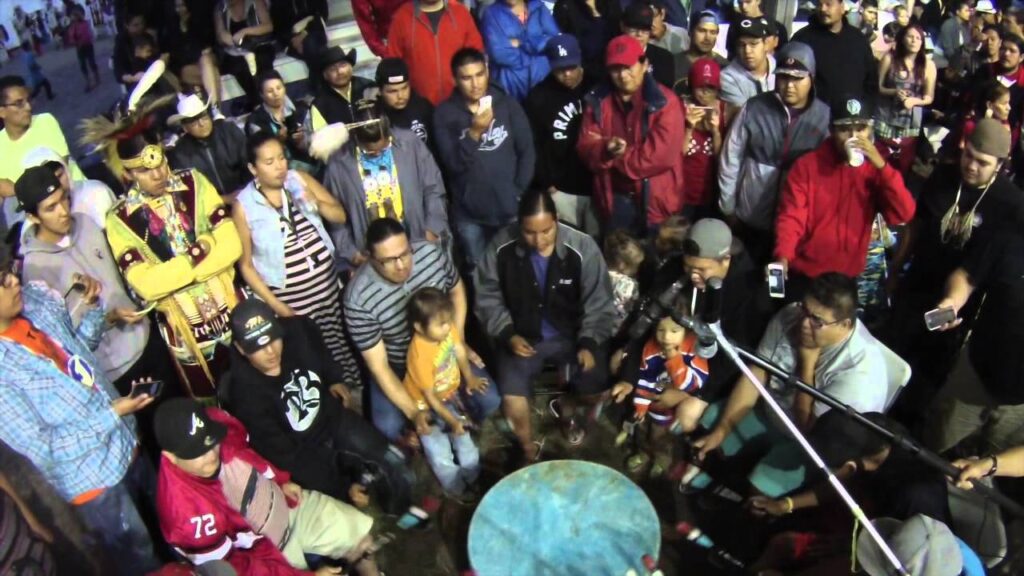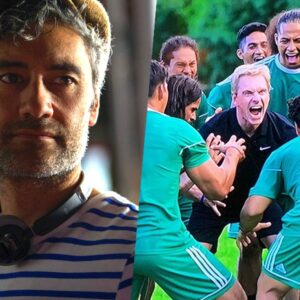
TORONTO – When the Alberta-founded First Nations collective Young Spirit rolls into the Grammy Awards this weekend it’ll be a co-ordinated effort to rival any pop star’s massive entourage.
Some members of the 16-person singing group will fly south on commercial airlines, while others who live in the United States plan to embark on road trips to Los Angeles where the music industry’s most prestigious event takes place.
All counted, 10 performers in Young Spirit will descend on the Grammys pre-telecast on Sunday where they’re nominated for the first time. Their album “Mewasinsational – Cree Round Dance Songs” is contending in the best regional roots category.
Co-founder Jacob Faithful says locking in so many tickets from organizers wasn’t easy, but he hopes the group’s enthusiastic attendance bodes well for a win.
“Travelling and singing together has brought us a lot of good fortune,” he said in a phone call ahead of the awards ceremony.
“It’s challenging but at the same time very rewarding.”
After 18 years of playing pow wows and other Indigenous events, Faithful has Young Spirit running like clockwork, even though the effort requires endless co-ordination. Its members are spread across places that include Saskatchewan, Alberta and British Columbia, as well as in Nevada, California and Idaho.
Faithful insists the distance isn’t necessarily a setback.
“We’re close-knit,” he says. “They bring their families on the road.”
Working together has grown into an annual tradition, Faithful adds.
It begins every spring at the Gathering of Nations in Albuquerque, N.M. where the Cree singers convene to participate in the largest pow wow in North America. It’s a warm-up for a few months of extensive touring across states and provinces – from Quebec to southern California.
“It’s like riding a bike,” Faithful, 40, says of the process.
“We essentially save up all year for the summertime – and then we hit the road.”
But before that begins, Young Spirit heads into a recording studio to lay down a full album of new material that works as the foundation of their summer tour dates. The Grammy-nominated “Mewasinsational – Cree Round Dance Songs” was recorded two years ago.
With each album, Faithful oversees the production as a composer and lead singer. He also shares drumming responsibilities with his group and plays the Native American flute.
Faithful says the group’s primary goal is to inspire younger generations of Indigenous people. They began that objective back in 2001 when the group, based in the Frog Lake Cree First Nation in Alberta, didn’t have a name and only consisted of Faithful and two of his brothers.
Asking their elders for guidance, Faithful says they were urged to consider how to inspire younger generations to maintain their culture and traditions.
“They named us ‘Oskiyak kisik’ – the exact translation to youngster,” he said.
In English, they became known as Young Spirit – or Young Spirit Singers as the Grammy nominations list them.
Over the years, Young Spirit grew both in popularity and size. The group collected numerous accolades within Indigenous communities, including a prize at the Indigenous Music Awards last year. But recognition from the Grammy organizers is something entirely new.
“The big difference… is to get recognition on a world stage,” Faithful says.
Being nominated alongside “performers from Hawaii or other parts of the world, it’s a great feeling for our First Nations people to be recognized.”
Faithful says regardless of whether Young Spirit wins, he’s confident the group will reap many other rewards from the experience. They’ve rented a large house a couple blocks from the Grammy venues with a pool and enough room for all the members.
“It’ll be a cool little vacation,” he says.
“We’re making memories. Sometimes people only get nominated once in their lifetime, so this may be our one time.”
Faithful says he’s hopeful for the future of Indigenous music too, both inside the traditional communities and with new listeners from around the world. He says recent political shifts in Canada have created more awareness for various issues, whether it’s the impact of residential schools or missing and murdered Indigenous women.
“I don’t think people are taking a blind eye to everything now – there’s an awareness out there,” he says.
“It’s not something great and monumental right now, but for generations to come, decades upon decades after us, you’re going to see a little bit more of understanding… There’s a lot of beauty, a lot of love, and we’re having more of an openness to see it now. More importantly to hear it.”











